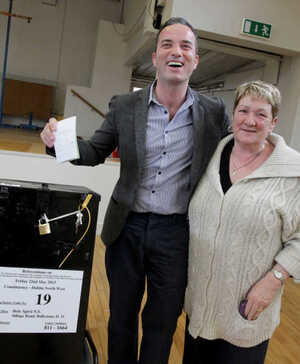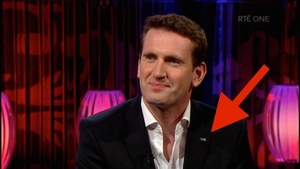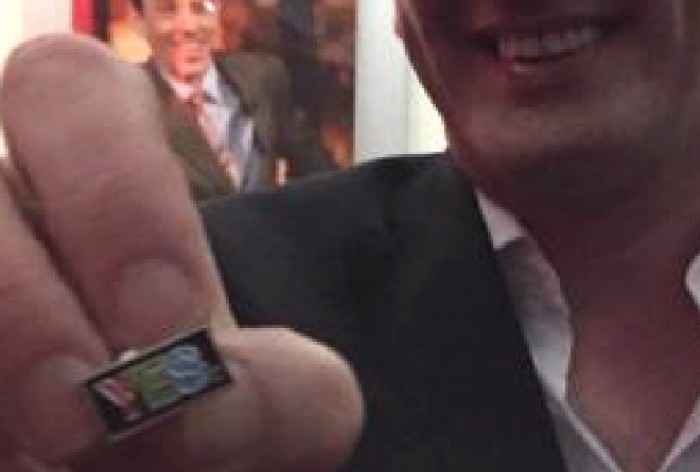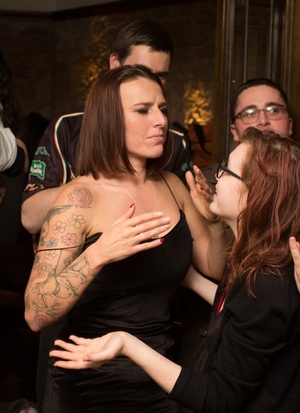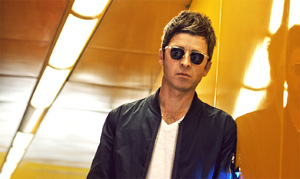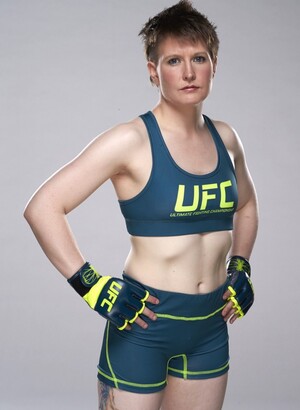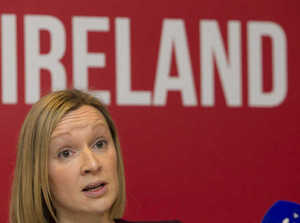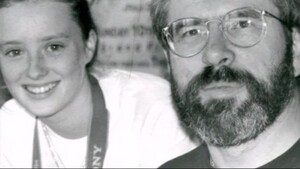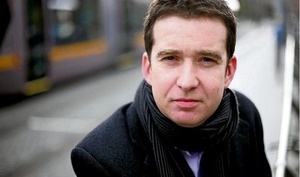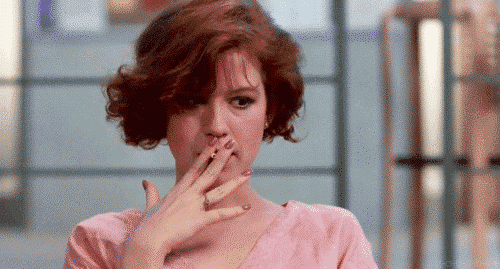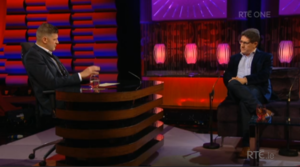
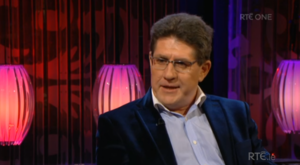
Paul Kimmage on the Saturday Night Show last night
Journalist Paul Kimmage, a former professional cyclist who helped expose Lance Armstrong’s drug use, was on the Saturday Night Show last night.
The subject he focused on was Irish rugby and he raised his concerns in relation to the possible use of drugs within the sport.
Mr Kimmage refused to agree with host Brendan O’Connor that no Irish rugby player had ever been suspended for doping. Instead, Mr Kimmage said he was looking into it.
Brendan O’Connor: “What are you saying is going on in rugby?”
Paul Kimmage: “Well, in some ways, you know, the pieces I’ve done recently about rugby start with myself and, you know, where I came through with cycling. I heard about a book that had been written in France by a former French international called Laurent Bénézech and I made an effort to get hold of the book. I read the book, I contacted Laurent and I asked him to explain various passages in it. And we went through it, from A to Z. And what I found really interesting about Laurent Bénézech was the response to this book in France which was really interesting because it was almost a mirror image to what happened to me when I wrote Rough Ride back in 1990. Basically, nobody wants to know about this and…”
O’Connor: “OK, and you’re suggesting, you’re drawing that parallel that rugby is at the point now that cycling was at then and that there is systematic doping going on, is that what you’re saying, like?”
Kimmage: “I don’t think it’s as bad.”
O’Connor: “OK.”
Kimmage: “But I think there is a problem there and I think that the problem isn’t addressed. And I think if the problem isn’t addressed then it could get very bad.”
O’Connor: “What is the problem? Maybe we should just for, to clarify it for people because you have been accused by some rugby people of kind of conflating a lot of stuff so maybe if we, will be break it down a little bit?”
Kimmage: “Well let’s start with the accusation of me conflating. I’ve made no accusation at all. All I’ve done is bring the Irish public a view from inside the game, someone who’s played the game at the highest level, who’s written this book, who’s made some very valid points that have been agreed by a judge and he wants to start a debate about where the sport is going. That’s all. I’ve made no accusations about the sport at all.”
O’Connor: “OK, so what…”
Kimmage: “But what I find really interesting, Brendan, is that I wrote these two pieces with Laurent, the pieces were published in the Sunday Independent my newspaper, and for a week, a week after those pieces, which were really, really, there wasn’t a word, not a whisper about this.”
O’Connor: “OK.”
Kimmage: “And I found that in itself…”
O’Connor: “Well he’s talking about France aswell, that’s France.”
Kimmage: “Yeah sure, but nobody said, ‘listen Paul, I read those pieces, he was talking about France’ – there was no reaction. At all.”
O’Connor: “Well what is he saying exactly. Because like, for example, we all know that from young lads up to, they’re all taking…”
Kimmage: “You’re not biting on this silence bit at all, no?”
O’Connor: “No, because, you know what, before we talk about that, we need to actually ascertain what…”
Kimmage: “I’m biting on it because it’s a big part of the problem.”
O’Connor: “No, you need to explain to people first what is going on in rugby. You need to say what…”
Kimmage: “Well, ok, well I think it’s fair to say that everybody here, everybody here, in the audience and to yourself, that the game has changed. The players are bigger now and stronger and more physical. The hits are harder. It was once a game for all sizes, now it’s one size fits all. You don’t run around players anymore, you run through them.”
O’Connor: “So, supplements which are entirely legal for that and you have conditioning coaches and sciences…”
Kimmage: “Absolutely…that creates, that creates an emphasis on size and on bulk and where once you had guys spending time throwing the ball around and skills, now they’re gym bunnies. Weights, massive weights, protein shakes, big, big, big, power, power, power. Now, you can for sure get that size and get that bulk through natural supplements but there’s a much quicker way and that’s through steroids and through performance-enhancing drugs. That’s an element of the problem that Laurent Bénézech is talking about.”
O’Connor: “Ok, so, are you…”
Kimmage: “The more important element is the, if you want, legal medication that is being used along with this and by that I mean painkillers. Now, you take a painkiller if you’ve got a headache, right? I know several internationals, Irish internationals, who take painkillers before they go out to play. Now, as someone who has competed at sport, at the highest level, the ability to endure pain is what separates the great from the good. Now if you’re taking painkillers…”
O’Connor: “Are they taking painkillers on the day of the match, before?”
Kimmage: “Literally..Co-codamol, stuff like that.”
O’Connor: “Now, legally, you’d have to be what 48 hours…”
Kimmage: “No, you can take painkillers there’s no…that’s OK.”
O’Connor: “OK.”
Kimmage: “But why are they doing it?”
O’Connor: “And that’s, it is legal and everything yeah?”
Kimmage: “Absolutely. But why are they doing it? Is it healthy? You see the argument. As Bénézech said, the health of the players is his primary concern. So you’ve got painkillers. You’ve got the stuff they use for rehab, after they get injured. Strong stuff, corticosteroids.”
O’Connor: “OK, again, legal?”
Kimmage: “Legal up to 48 hours around the game but that in itself…”
O’Connor: “Are you saying that shouldn’t be legal?”
Kimmage: “I’m saying that doctors need to actually stand back and look at what’s happening here and just, you know, think about the health of the players. Even the supplements being used now. I don’t know Even the supplements being used now. I don’t know if you know how about foie gras and how they do that with the ducks…”
O’Connor: “They force feed them…”
Kimmage: “And this is what’s happening to our rugby guys now. They’re waking up, I mean there was a piece I read recently, fellas waking up in the middle of the night, cooking omlettes, protein, cramming, cramming, cramming…now I don’t know, Brendan, that’s not my idea of sport…”
O’Connor: “But, in fairness, that’s not doping though…”
Kimmage: “No it’s not, but Laurent Bénézech is..”
O’Connor: “Are you saying that, as well as that, there’s…”
Kimmage: “Laurent Bénézech is not talking about doping, he’s talking about the medicalisation of performance in rugby. Now a lot of people have cottoned on and there is an element of doping to that and a lot of people have zoomed in on that…”
O’Connor: “Well ok, what’s the element of doping because we…”
Kimmage: “…And because it’s Paul Kimmage, people are getting hysterical about it. ‘This guy is on the warpath again, he’s trying to destroy our sport.’ Nothing could be further from the truth. I really like rugby, I enjoy rugby, I enjoy the players. I’m doing, my duty as a sports writer to convey a very important message that sport needs to hear.”
O’Connor: “Ok, so far, and I just want to be really clear on this obviously because there are a lot of people who can disagree with you and have disagreed with you. So far, you’re saying that that the stuff that’s legal.”
Talk over each other
O’Connor: “So far, you’re saying that that the stuff that’s legal, there are questions over some of that. Are you saying that there’s also stuff that they shouldn’t be doing? Like, presumably, human growth hormones, steroid and all that?:
Kimmage: “Absolutely, there is that and he’s produced evidence of that in the book and some very worrying stories about the World Cup in 2007 and some of our big rivals and their performance during that, you would look at it and say, ‘god, he has a point there.”
O’Connor: “Ok. Do you think that people in Ireland are at a disadvantage given this isn’t going on in Ireland and it’s going on internationally?”
Kimmage: “Well, you’re saying it’s not going on in Ireland. I don’t know, I’ve started…”
Talk over each other
O’Connor: “Well Alan Quinlan, who seems to have taken you on, in the Irish Times, he’s been around 20 years and never seen any evidence of it…”
Kimmage: “Well, I thought that was interesting. I thought Alan’s piece in the Irish Times was very interesting because again – I’ll come back to the silence – nothing happened for a week and then I happened to be out with Malachy Clerkin [of the Irish Times] who ghosts Alan’s column. I said to him, ‘here, listen, what’s going on here? I’ve written these very interesting pieces, you’ve gotten Alan Quinlan there, why don’t you get him to write about this.’ He said, ‘right so, I will’. And then, ten days later, Alan produced a quite defensive piece about the game here but if he actually…”
O’Connor: “Well, I suppose defensive because he felt you were attacking the game…”
Kimmage: “Which I don’t understand, which I don’t understand, you see that’s a knee-jerk reaction, I’m attacking the game, I’m not attacking the game at all, he needs to just address the arguments. And actually he was actually speaking, he didn’t realise it, but if you look at how he explained the game and how his time in the game and the stuff he was taking, a lot of the arguments he was making were Bénézech’s arguments.”
O’Connor: “Hang on, no, what he said was, he said he took supplements because he was tall but he was skinny. He took the kind of supplements that every underage kids are taking them now, there’s nothing illegal about them and the other thing he said is that he’d had cortisone injections down the years, on a couple of occasions I think, which again, he did nothing wrong there. That was all within the rules.”
Kimmage: “The most vivid image from that piece was, what do you call those things you shove up your…”
O’Connor: “Suppositories.”
Kimmage: “The word escaped me. It was a suppository he had to take straight before the game. That’s what jumped out at me. And again that’s legal but look, you know, is that our idea of sport?”
O’Connor: “Ok.”
Kimmage: “Not for me.”
Talk over each other
Kimmage: “I find it really interesting, again, anybody who is making a living from the game or playing the game, they don’t want to know about this. They won’t engage at all. But if you talk to parents or people outside the game, they actually see what’s going on. People aren’t blind to this. And they’re worried. And they’re looking at their kids thinking, ‘well, actually, do I want my son doing this, if the sport…’ And you look at the response to the concussion issues and the way that rugby people have pushed back on that. There’s some very good piece in the Irish Independent today or yesterday by Vincent Hogan about the rugby authority, the way they’ve resisted the concussion issue and it’s exactly the same as the way they reacted to the doping issue. It’s the same thing. Oh, ‘no, that’s bad for business’.”
O’Connor: “You’re saying doping, so you’re saying, you’re talking here now, just to be clear again, you’re not talking about the legitimate stuff, you’re talking about..”
Kimmage: “I’m talking about the medicalisation of the performance in rugby.”
O’Connor: “Yeah, ok, but just, you know why I want to be clear on this. Because…”
Kimmage: “That includes doping, that includes doping, of course.”
O’Connor: “Ok, do you think this is going on in Ireland?”
Kimmage: ” Well, you know, I mention my own path and the 25 years of coverage and we had a famous swimmer here and she did and extraordinary thing and people were outraged, outraged that there was a suggestion that an Irish woman would cheat. Outraged by it. Because Irish people don’t cheat. Now we know that that’s a nonsense. So to suggest that there’s, you know, a doping problem in rugby – which there is – and I’m using the word now, there is a doping problem in rugby and it’s not just me. It’s the chief executive of the RFU in England who said it, it’s, if you look at that Alan Quinlan piece, the photograph used with that was a picture of our under-20s with ‘keep rugby clean’ T-shirts. So there is an acknowledgement that there is a problem there. And to think that that doesn’t apply in Ireland. Or that Ireland, or that we’re immune to this, that’s naive.”
O’Connor: “There’s dope testing in rugby, there’s no evidence in Ireland of anyone doping is there?”
Kimmage: “There’s no evidence? Well I don’t know Brendan. I’ve just, as I say, I interviewed Laurent in November and I’ve started looking at it now and I’m going to conduct some more interviews and actually try and find out that, find the answer to that question.”
O’Connor: “OK, but as it stands, there’s nobody that we know of, no Irish player, has been suspended for doping or anything?”
Kimmage: “I’m not sure about that.”
O’Connor: “OK”
Kimmage: “You want me to say no.”
O’Connor: “No, I don’t, I just, ok, so that’s something that you’re looking into.”
Kimmage: “I’m looking into, yeah.”
O’Connor: “So talk to me about the silence. Does it feel to you a little bit like kind of the omerta…”
Kimmage: “Well the silence worries me.”
Talk over each other
Kimmage: “The real problem in cycling is the refusal, and it’s going today, cyclists still won’t. We’ve got Dan Martin, Nicholas Roche, Sam Bennett and Philip Deignan and you try and engage them and engage them. I mean Nicolas Roche writes a column in the Irish Independent and I don’t think , I’m not sure if he ever mentioned doping in all of the three, four years he’s done it. And that’s silly. You know. But that’s the culture he works in. The culture he works in does not encourage him to do that and until we, unless you change that, you will never get rid of this problem. And the parallel with rugby is the silence. Laurent Bénézech wrote this fantastic book, made this very plausible and intelligent argument and when you, when you see the response to that you see have to worry. What is the problem with engaging him in a debate about that?”
Watch back in full here
Related: Paul Kimmage: Rugby has to face up to its growing pains (November 23, 2014, Paul Kimmage, Sunday Independent)
Paul Kimmage: Dangerous obsession with size creates bigger need for answers (November 30, 2014, Paul Kimmage, Sunday Independent)
Paul Kimmage: ‘Rugby needs to address drugs issue. All we are hearing is silence’ (December 3, 2014, Declan Whooley, Irish Independent)


